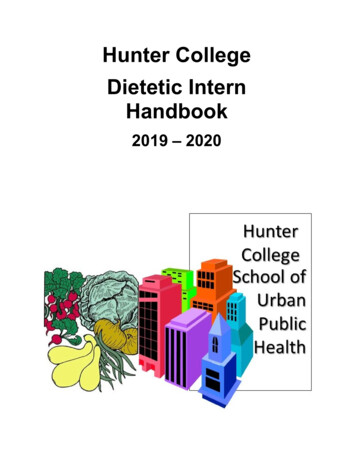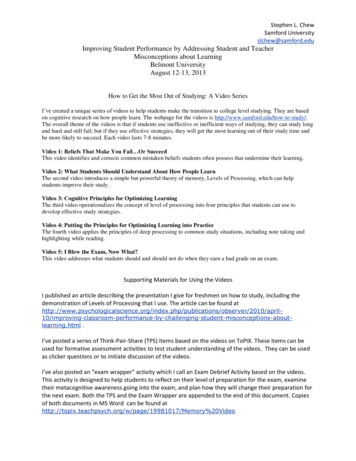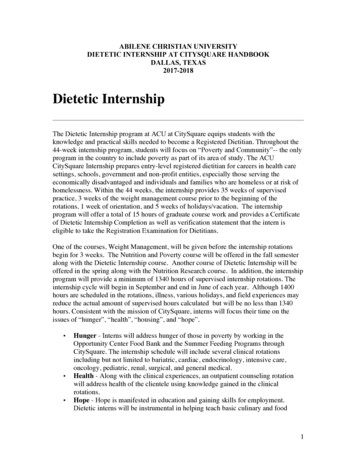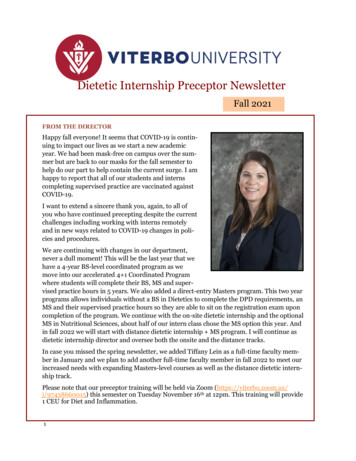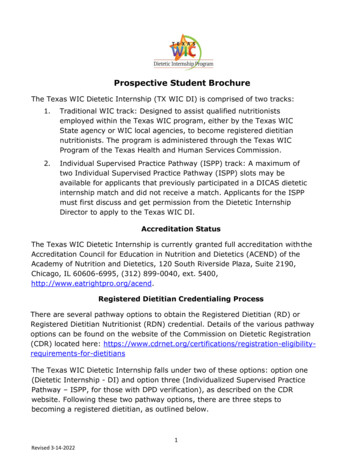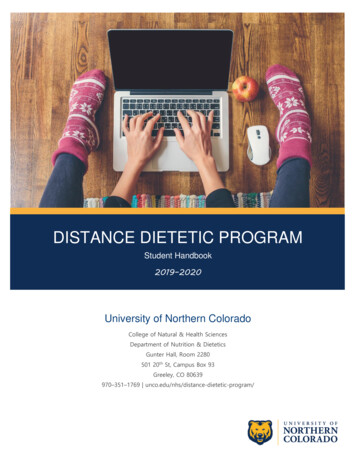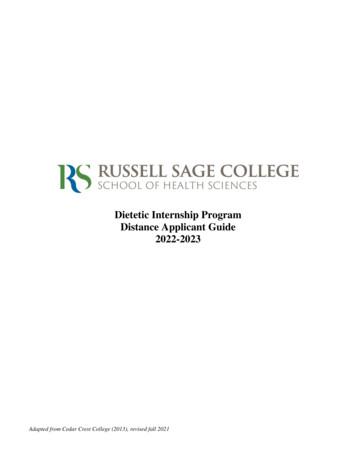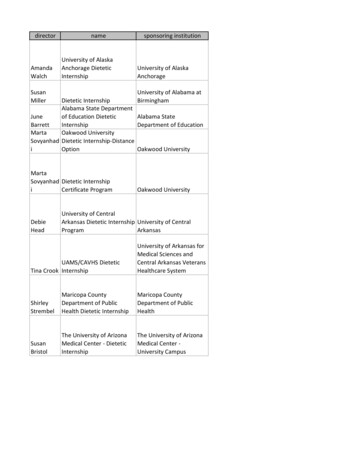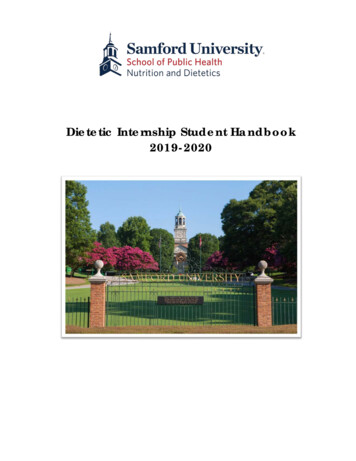
Transcription
Dietetic Internship Student Handbook2019-2020
TABLE OF CONTENTSContentsWELCOME TO SAMFORD UNIVERSITY! .5GENERAL INFORMATION .6Purpose of the Handbook .6Introduction to Samford University .6Mission.6Core Values .6Introduction to the Nutrition and Dietetics Department .6Department of Nutrition and Dietetics Faculty .7DIETETIC INTERNSHIP .9Mission .9Program Overview .9Program Goals . 10Program Goal 1 . 10Program Goal 2 . 10Program Goal 3 . 10Accreditation Status . 11Admission Requirements . 11Academic and Work Experience Requirements . 11Admission Process . 12DICAS . 12Early Acceptance/Preselect Option . 13Distance Learning Option . 13Costs . 14ACCEPTANCE . 15Materials Required Upon Acceptance . 15Health Accountability . 15Health Insurance. 15Professional Liability Insurance . 151
Substance Use and Background Check . 15Valid Driver’s License and Car Insurance . 18Preparation for Internship After Acceptance . 18Required Campus Weeks . 18INTERNSHIP ACADEMIC INFORMATION . 19Academic Plan of Study . 19Didactic Courses in the Internship . 20Rotation Experiences . 20Overview of Rotation Experiences . 21Rotation Requirements . 21Rotation Facilities Site Examples . 22Professional Growth . 22Volunteer Activities . 23Academic and Rotation Integrity . 23Grading Policies (Assessment of Intern Learning) . 23Rotation-Specific Grading . 23RESPONSIBILITES. 24Facilities’ and Preceptors’ Responsibilities . 24Samford University Responsibilities to Students and Facilities . 24Title IX . 24Family Educational Rights and Privacy Act (FERPA) . 24Service Animals in Rotations . 24Student Responsibilities . 25Attendance . 25Daily Attendance and Absences . 25Tardiness. 26Illness, Accident, Injury . 26Funeral and Family Emergency Leave . 26Attire/Dress Code . 26Professionalism. 28Attitude . 28Preparedness . 28Work Standards . 28Code of Ethics for the Profession of Dietetics . 282
TECHNOLOGY AND MANAGEMENT SYSTEMS . 30Software. 31Technology Resources . 31Computing Laboratories . 31Wireless Network Access. 31Canvas . 31Typhon . 31Security . 31PRIOR ASSESSED LEARNING (PAL) . 32Procedures. 32PAL Credit Rubric . 32COMPLETION REQUIREMENTS . 33Maximum Time for Internship Completion . 33Completion of the Internship and Verification Statement . 34Registration / RDN Credentialing. 34State Licensure . 34CONCERNS AND WITHDRAWALS . 35Handling Complaints from Interns . 35Handling Complaints from Preceptors . 35Remediation . 35Withdrawal . 35Leave of Absence . 36Reinstatement . 36FINANCIAL INFORMATION . 37Financial Aid . 37UNIVERSITY AND CAMPUS SERVICES . 38Counseling and Testing Services . 38University Libraries . 39Dietetics Program Resources . 39UNIVERSITY POLICIES AND REQUIREMENTS . 40Equal Opportunity . 40Protection of Student Confidentiality. 40Health Insurance . 40Insurance Coverage . 403
Illness and Health Services . 40Inclement Weather . 40Sexual Harassment, Violence, and Assault . 41APPENDICES . 42Appendix 1 - Samford University Dietetic Internship Ethical Behavior . 42Appendix 2 - Samford University Dietetic Internship Prior Assessed Learning . 43Appendix 3 - Samford University Dietetic Internship Precepting Facilities and Organizations . 44Appendix 4 - Samford University Dietetic Internship Precepting Facilities and Organizations forDistance-Supervised Practice Rotations . 45Appendix 5 - Samford University Dietetic Internship Student or Facility Complaints . 46Appendix 6 - Samford University Academic Integrity Policy . 47Appendix 7 - Incident Form . 52Appendix 8 – Advisory Board of the Department of Nutrition & Dietetics . 53ATTACHMENTS . 554
WELCOME TO SAMFORD UNIVERSITY!Congratulations on reaching this most exciting stage in your life and welcome to Samford University’sDietetic Internship! Samford University is the 87th oldest university in the United States. It was founded asa private Christian university under the name of Howard College in Marion, Alabama, in 1841. The campusmoved to Birmingham in 1887, and in 1965, the school was renamed Samford University to honorbenefactor and trustee Frank Park Samford. The University is known for high educational standards andits beautiful campus that is located in Birmingham, Alabama. It was described as the “Williamsburg ofAlabama” when the present campus opened in 1957. From humble beginnings in Marion, with only 31students, Samford is now home to over 5,500 students and commands a rank of 4th among RegionalUniversities in the South in the 2019 U.S. News and World Report's annual college rankings and is thehighest ranked university in Alabama in any peer group.Founded by the Alabama Baptists, Samford stresses vigorous learning and personal faith by developinginnovative teaching, learning, and research, and maintaining in the campus community an exemplaryChristian ethos and culture.The Nutrition and Dietetics Department’s Dietetic Internship program is a fully accredited postbaccalaureate certificate program, which can be combined with coursework leading to a Master ofScience in nutrition degree or a Master of Public Health degree. The Department of Nutrition andDietetics is one of 5 departments within the School of Public Health, in the College of Health Sciences.Our goal is to provide a rigorous didactic coursework combined with unparalleled learning experiences,supervised by preceptors, that will prepare you to be successful registered dietitian nutritionists (RDNs).Our Christian philosophy as a university and as a program calls us to a high standard. Our hope is that youwill continue this high standard for those you will be serving.We look forward to working with you as an intern and later when you become a registered dietitiannutritionist.Blessings,Suresh Mathews, PhD, FACN, FICSNutrition and Dietetics Department Chair5
GENERAL INFORMATIONPURPOSE OF THE HANDBOOKThis handbook is to be used as a reference and guide to learn more about the Samford University dieteticinternship program. The information will review steps to take to apply for an intern position as well asprovide information once selected as a Samford University dietetic intern. The guidance provided is foracademic policies and rotation purposes. The handbook is reviewed annually, with the last reviewcompleted May 2019 for the programmatic year of August 2019 - December 2020.INTRODUCTION TO SAMFORD UNIVERSITY“There are many great institutions of higher education, but there is only one Samford University. Here, adedicated faculty and energetic students join to create a community of learning and faith like no other.The beauty of Samford’s campus is virtually matchless, but it pales in comparison to the quality of ourpeople. From the classrooms and laboratories to the artistic stages and athletic venues, the minds andsouls of Samford people make the real difference. Samford people bring the best, they are demandingand compassionate, and they know the importance of engaging the world with a faith that calls them toserve.” --- Dr. Andrew Westmoreland, President of Samford UniversityMISSIONThe mission of Samford University is to nurture persons in their development of intellect, creativity, faith andpersonhood. As a Christian university, the community fosters academic, career and ethical competency whileencouraging social and civic responsibility, and service to others.Anchored in Christian understanding, Samford University will be a diverse community, stressing vigorouslearning and personal faith, in the Baptist tradition. Within that commonality, the community will be:innovative in teaching, learning, and research; sensitive to global issues; aggressive in self-assessment andcontinuous improvement. Faithful to its mission, Samford will be known and acknowledged worldwide byholding to its core values. The world will be better for it.Core ValuesThe Samford community values lifelong: Belief in God, the Creator of heaven and earth, and in Jesus Christ, His only Son, our Lord Engagement with the life and teachings of Jesus Learning and responsible freedom of inquiry Personal empowerment, accountability, and responsibility Vocational success and civic engagement Spiritual growth and cultivation of physical well-being Integrity, honesty, and justice Appreciation for diverse cultures and convictions Stewardship of all resources Service to God, to family, to one another, and to the community.Introduction to the Nutrition and Dietetics DepartmentThe Nutrition and Dietetics Department is one of five departments in the School of Public Health, withinthe College of Health Sciences. For more than 100 years, Samford University has been preparing studentsfor careers in nutrition and dietetics. The Department offers two undergraduate degrees: a Bachelor of6
Science in Foods and Nutrition and Bachelor of Science in Nutrition and Dietetics; a post-baccalaureatecertificate program in dietetic internship, and a Master of Science degree in nutrition.Opportunities for graduate coursework while completing Dietetic InternshipDietetic internship students have the option of pursuing the Master of Science degree in Nutrition or theMaster of Public Health degree (through the Department of Public Health), along with the dietetic internshipcertificate program. Coursework leading to both degrees are taken in conjunction with the dietetic internshipand completed in the same four semesters. For individuals who have been accepted into the dieteticinternship, the graduate school application process is waived. Students are enrolled in online didactic coursestheir first semester. During their second semester, students complete supervised practice courses required forthe dietetic internship along with master’s degree courses. Twenty-five credit hours earned during thedietetic internship will be applied towards the MS degree in Nutrition or towards the MPH degree.For additional details, visit the following webpages:MS Nutrition: ence-in-nutritionMPH: lic-healthDepartment of Nutrition and Dietetics FacultySuresh Mathews, PhD, MPhil, MSc, FACN, FICSProfessor/Chair, Nutrition and Dietetics ProgramDr. Mathews is an accomplished educator, researcher, and administrator whopreviously served as Associate Professor and Graduate Program Director ofNutrition at Auburn University. He has taught a variety of courses in the didacticprogram in Nutrition and Dietetics, at both undergraduate and graduate levels, andmentored several MS students, PhD students, and post-doctoral fellows. In 2014 hewas elected Fellow of the American College of Nutrition. He has publishedextensively in the area of obesity and diabetes and his research has been supportedby grants from the American Diabetes Association, USDA National Institute of Foodand Agriculture and other funding agencies.Patricia H. Terry, PhD, RDN, LD, FANDProfessor and Foods Lab Director, Department of Nutrition & DieteticsPat Terry has been a professor of nutrition and dietetics at Samford University since1990 and twice served as chair of the department. She received her PhD inNutrition from Texas Woman's University. She has been a registered and licenseddietitian for over forty years. Dr. Terry has continued community nutritioninvolvement through Samford Wellness Kitchens, offering nutrition educationclasses and health fairs for families. In the Samford College of Health Sciences andthe Department of Nutrition and Dietetics, Dr. Terry 's research has been foodfocused, especially in the area of food science and experimental foods. Shecontinues to mentor Samford undergraduate experimental foods students, whohave won research awards at the state and national level.7
Donna Seibels, MS, RDN, LD, FANDAssistant Professor and Director, Didactic Program in Dietetics ProfessorDonna R. Seibels began her dietetics career working with women, infants andchildren in the WIC program at the clinic level and eventually in the role of AreaCoordinator for Public Health/WIC. After moving to Birmingham, she worked as aSenior Nutrition Consultant in the area of Nutrition Education and Breastfeedingsupport within the Jefferson County Health Department. From this position,Seibels was called to work with the Nutrition and Dietetics program at SamfordUniversity as Director of the Dietetics program. In addition to her work at SamfordUniversity, Seibels is an active member of the Birmingham District DieteticAssociation, the Academy of Nutrition and Dietetics and the NDEP Practice groupwithin the Academy of Nutrition and Dietetics.Keith Pearson, PhD, RD, LDAssistant ProfessorKeith Pearson received his undergraduate education in dietetics in his home state ofWest Virginia before moving to Birmingham to complete his graduate training atUAB. His doctoral research focused on the role of dietary patterns in thedevelopment of cognitive decline in adults. Prior to Samford, Keith worked clinicallyas a dietitian at the Birmingham VA Medical Center and also served as an adjunctinstructor at the University of Alabama and a freelance nutrition writer at Healthline.Coming to Samford has allowed Keith to combine two of his strongest passions: thefield of nutrition and the education of future health professionals.Amy Cameron, MS, RD, LDInstructor and Dietetic Internship DirectorAmy completed her undergraduate degree in Nutritional Sciences at Texas A&MUniversity and Dietetic Internship and graduate degree in Clinical Nutrition fromUAB. She comes to Samford following a seven-year career at Children’s of Alabamaworking in the Gastroenterology, Nephrology, and Cardiology Departments. Amywas the Unit Educator for the Nutrition Department and served as Adjunct Facultyfor Pediatric Simulation Center. Amy spent much of her time at Children’s workingwith Dietetic Interns and has a passion for teaching and training the nextgeneration of dietitians to serve their communities with the strengths God hasgiven them.Megan Kaal, MS, MBA, RDN, LDInstructor and Clinical CoordinatorMegan Kaal received her undergraduate education here at Samford University. Shetraveled to Dallas to complete her dietetic internship at the Baylor UniversityMedical Center. She returned to Birmingham where she worked for ten years atUAB Hospital as a clinical dietitian. Kaal gained significant experience in workingwith the geriatric population as well as in the outpatient setting ofCardiopulmonary Rehab and the radiation oncology clinic. Her role at Samfordallows her to combine her love for learning with her clinical experience. In her freetime Megan enjoys spending time outdoors and traveling.8
DIETETIC INTERNSHIPThe dietetic internship is a critical piece for careers in nutrition. It is a 16-month post baccalaureateprogram in which a series of experiences are completed that are designed to prepare interns for a careerin nutrition. Samford University’s program concentration area is community nutrition and public health,with a strong focus on leadership and advocacy.On completing the program, the national Registration Examination for Dietitians offered by theCommission on Dietetic Registration (CDR) may be taken. Samford’s dietetic internship is committed tothe enhancement of quality of life for individuals, communities and global societies through service andthrough the nourishment of body and spirit.MissionThe mission of the Samford University Dietetic Internship is to produce entry-level registered dietitiannutritionists who are resourceful leaders, effectively serving the nutrition needs of diverse persons in theircommunities with integrity, compassion, and respect.The program at Samford University is designed to provide the knowledge, practical skills, and professionalvalues that meet the standards of education and core competencies for registered dietitian nutritionistsestablished by the Accreditation Council for Education in Nutrition and Dietetics (ACEND) of The Academyof Nutrition and Dietetics (AND). The internship provides a concentrated experience in communitynutrition and public health. It integrates four didactic courses with supervised practice in a plannedprogression of learning activities designed to advance interns’ ability to function as leaders in theirprofession, advocates for better health for diverse members of society, and compassionate providers ofnutrition care and education. Samford’s internship is committed to the enhancement of quality of life forindividuals, communities, and global societies through service and through the nourishment of body andspirit.Upon completion of the program, graduates will be prepared to work with key leaders to influence policyand legislation. Graduates will be involved in helping to develop quality programs to improve healthbehaviors and influence health outcomes in response to the needs of th
Appendix 2 - Samford University Dietetic Internship Prior Assessed Learning. 43 Appendix 3 - Samford University Dietetic Internship Precepting Facilities and Organizations . 44 Appendix 4 - Samford University Dietetic Internship Precepting Facilities and Organizations for
